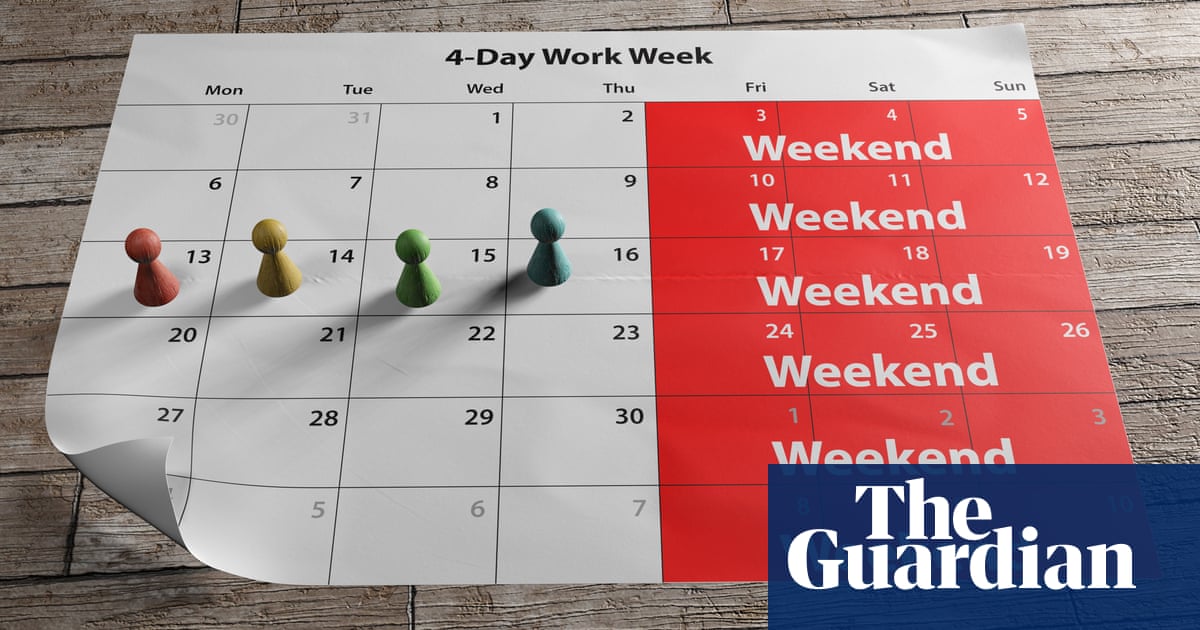Most of the UK companies that took part in the worldâs biggest ever four-day working week trial have made the policy permanent, research shows.
Of the 61 organisations that took part in a six-month UK pilot in 2022, 54 (89%) are still operating the policy a year later, and 31 (51%) have made the change permanent.
More than half (55%) of project managers and CEOs said a four-day week â in which staff worked 100% of their output in 80% of their time â had a positive impact on their organisation, the report found.
For 82% this included positive effects on staff wellbeing, 50% found it reduced staff turnover, while 32% said it improved job recruitment. Nearly half (46%) said working and productivity improved.
The reportâs author, Juliet Schor, professor of sociology at Boston College, said the results showed âreal and long lastingâ effects. âPhysical and mental health, and work-life balance are significantly better than at six months. Burnout and life satisfaction improvements held steady,â she said.
But Matthew Percival, a director at the Confederation of Business and Industry, said the four-day week was not a âone size fits all answerâ and would be âunlikely to pay for itself in many industriesâ.
He said: âIf businesses have the budget to add to their offer to employees, then they will be considering the relative merits of reducing working hours compared to increasing pay, pensions or paid parental leave, as well as better supporting health and wellbeing.â
The four-day working week report, by the thinktank Autonomy and researchers from the University of Cambridge, the University of Salford and Boston College in the US, found that âmany of the significant benefits found during the initial trial have persisted 12 months onâ, although they noted that it was a small sample size.
Almost all (96%) of staff said their personal life had benefited, and 86% felt they performed better at work, while 38% felt their organisation had become more efficient, and 24% said it had helped with caring responsibilities.
Organisations reduced working hours by an average of 6.6 hours to reach a 31.6-hour week. Most gave their staff one full day off a week, either universal or staggered. The report found that protected days off were more effective than those on which staff were âon callâ or sometimes expected to work.
The most successful companies made their four-day week âclear, confident and well-communicatedâ, and co-designed their policies between staff and management, thinking carefully about how to adapt work processes, the authors wrote.
Challenges encountered by some companies included working with clients and stakeholders where four-day weeks were not the norm, or where the policy was implemented unevenly, leading to resentment among some staff.
This month, the Scottish government launched a four-day working week trial for some public services. Autonomy is calling for the Westminster government to introduce policies that would enable its wider take-up, including giving workers the right to request a four-day week with no loss of pay, a public sector trial, and funding to support the shift in the private sector.
after newsletter promotion
Paul Oliver, chief operating officer at Citizens Advice Gateshead, said that a four-day week helped his employees cope with a âdemanding roleâ, and improved retention as the charity was unable to pay high salaries. âWe wanted to see a way to improve staff conditions so they would be better rested and could give more to work,â he added.
The greater efficiency introduced by the pilot meant it exceeded its targets, including improving the quality of advice and the number of clients spoken to, expanding to a seven-day service thanks to greater flexibility, increasing profitability and reducing levels of staff sickness. âWeâre breaking out of the nine to five model, which doesnât work for our society or our clients,â Oliver said.
Mark Downs, chief executive of the Royal Society of Biology, said his organisation was keeping the policy â in which staff divvied up Mondays and Fridays off between them â because it had been positively received by staff and external partners.
One unexpected benefit he encountered was that days when he was working and most other staff were off were much more productive. He also felt it made RSB a more attractive employer, with applicants citing the four-day week as a draw.
Anthony Painter, director of policy at the Chartered Management Institute, said he was âfollowing the four-day week trials with interestâ since CMI research had shown that employees valued flexible working above all else, including pay rises.
He added that managers would need to be better trained to implement the changes. âThey will need the very best managers in place to ensure that flexibility and productivity can be two sides of the same coin â better ways of working,â Painter said.
A government spokesperson said: âWe have no plans to introduce a four-day working week. Ultimately it is for employers and employees to agree what working arrangements work best for them, and we will be making changes to our flexible working legislation in April, including the right to request flexible working from day 1 of a new job.â







